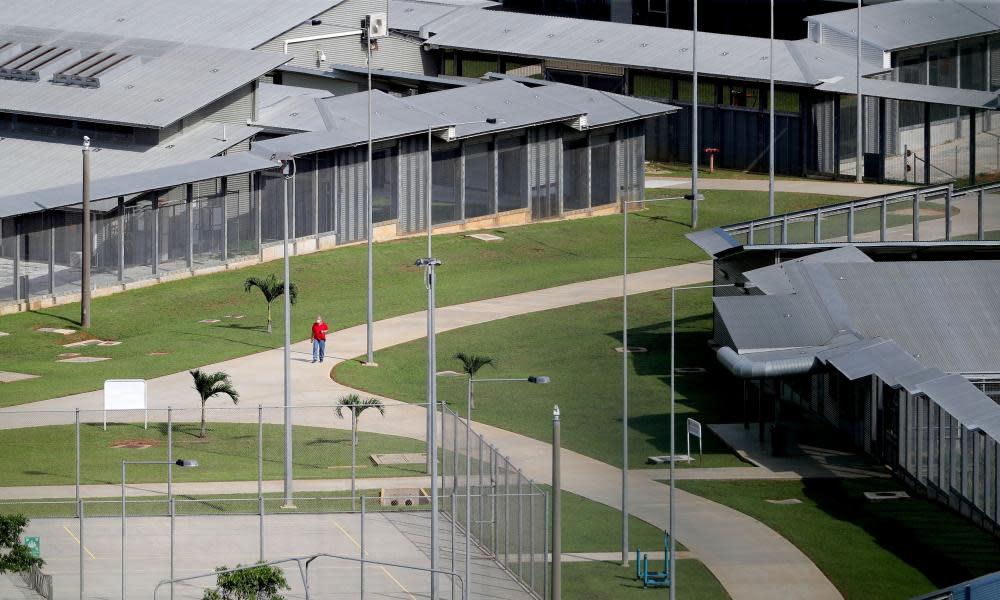'Depressed, anxious, bored, frustrated': Christmas Island detainees struggle with isolation

More than 30 people transferred to a remote immigration detention facility on Christmas Island have little access to internet and are struggling to contact their families.
The controversial North West Point detention centre on Christmas Island was reopened in August to relieve pressure on the onshore detention network, which had been nearing capacity.
At least 31 people have so far been transferred to the facility. The Australian Border Force declined to confirm the current detainee population on Tuesday.
One of the detainees is Les Reilly, who was transferred to Christmas Island from the Yongah Hill detention centre outside Perth in early August.
Related: New Zealand man dies while detained in Melbourne immigration detention centre
He said there were four computers with no video-calling software at the Christmas Island facility, but “you’re lucky if one works at a time”.
The detainees also don’t have access to wifi and their phone plans don’t work on Christmas Island, which is closer to Indonesia than the Australian mainland.
Detainees have not been allowed visitors in March, and losing video calls has now made that separation more difficult, Reilly told Guardian Australia over Facebook Messenger.
Reilly described his fellow detainees as “depressed, anxious, bored, frustrated”. “The hardest part is not being able to see our kids,” he said.
“We’re very concerned that people held on Christmas Island don’t have access to effective internet and their quality and quantity of communication with the outside world will be severely compromised,” Carolyn Graydon, principal lawyer for the Asylum Seeker Resource Centre, said .
“There are also real concerns around people’s access to medical treatment. There’s no tertiary hospital on Christmas Island and help for more serious health concerns is several hours away.”
The Australian Border Force commissioner, Michael Outram, told the Senate’s Covid-19 committee last week that he planned to eventually house 250 immigration detainees in the remote facility, at a cost of over $55m.
Related: Australian government to reopen Christmas Island detention centre during Covid-19 crisis
The people sent to Christmas Island will be “section 501s” – those who have had visas cancelled or refused on character grounds, he said.
But Graydon said the people transferred already included “people who are owed protection obligations in Australia”.
A refugee detained at Yongah Hill said everyone at that facility was nervous about being sent to Christmas Island.
“There’s just no internet, no phone, you can’t connect with family, that’s why everyone is afraid,” he said.
A number of detainees were transferred from Sydney’s Villawood detention centre to Yongah Hill over the weekend, apparently in preparation to be sent to Christmas Island.
Western Australia’s borders are closed to the rest of the nation, but the state’s police commissioner can issue exemptions. Under the WA government’s rules, detainees from interstate have to quarantine in WA for two weeks before going to Christmas Island, which has not seen a single coronavirus case.
The men transferred to Yongah Hill from Sydney are in a separate wing of the facility, but can enter a shared area for several hours of the day, the refugee said.
Australia’s immigration detainee population has grown throughout 2020, despite advice from infectious diseases doctors to release low-risk detainees to address overcrowding during the pandemic. Border closures have halted deportations, but people are still entering detention.
Related: From Manus Island to Melbourne: we do not even know what we are being punished for | Mardin Arvin
The Australian Border Force is also making changes elsewhere in the detention network. At the Melbourne Immigration Transit Accommodation detention centre (Mita), detainees have been told more single men will be moved into huts at the Broadmeadows Residential Precinct – a low-security compound that usually accommodates women and families, to make more room elsewhere in Mita.
On 10 August, the federal court ordered the government to cease detention of a 68-year-old Pakistani man with diabetes at Mita.
Justice Bernard Murphy found there was a “real and foreseeable risk” that the coronavirus would enter the facility, and that the man was exposed to “materially higher risk” in Mita than if he was in the Victorian community and able to wear a mask and practise social distancing.
Rather than release the man to address the risk of infection, the government elected to transfer him to Western Australia.
Amira (a pseudonym), who is detained at the Mita residential precinct, said that four men had been transferred to the precinct in the last week and more were still to come.
“It’s not good for social distancing, it’s not acceptable for other detainees,” she said. “All the people complain and say this is not a good idea if you bring more people here, because there is no space. Each room already has one person, each unit is already full,” she said.
Watch video below
Amira said the precinct’s activities room is small, and only four people are currently allowed in it at a time.
“How are they going to manage all of this? … We’re complaining there is not enough to space to do activities,” she said.
The transfers to Christmas Island also affected detainees’ access to activities, Reilly said. The detention centre there lacks the programs offered at Yongah Hill, like cooking and woodwork.
“There is a gym that is open two hours a day, but apart from that everyone just walks around the compound like zombies,” Reilly said.

 Yahoo News
Yahoo News 